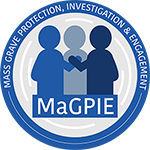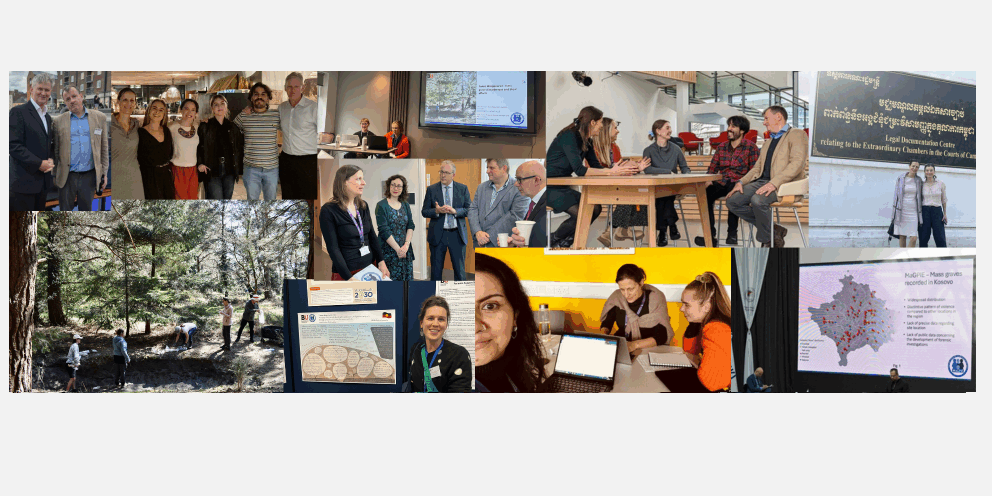With October 2025 marking two years since the launch of MaGPIE, the team took the chance to reflect on a year of progress and personal milestones. At Emily’s invitation, each member shared a highlight that they’re proud of, all of which are detailed below:
Anna:
A year on from joining MaGPIE as a PhD researcher focused on Indigenous rights surrounding unmarked graves, I’m proud of the time and care that’s been taken to understand and reflect on what working in this space means, and how I can best honour Indigenous Knowledges and experiences. Establishing an ethical framework and committing to local, place-based engagement has been integral, leading me back to Western Australia. Over the next twelve months, I’m looking forward to the opportunity to connect, collaborate and deepen understandings of the breadth and depth of the history and legacies of Indigenous unmarked graves across the state of Western Australia.
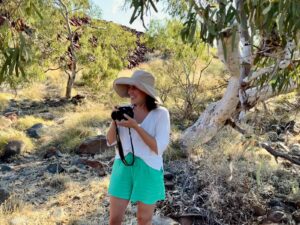
David:
One of MaGPIE’s primary goals is to disseminate information created and collected to the many different interested parties. Dissemination takes many forms: newsletters, social media posts; papers, conferences, presentations and meetings. As the MaGPIE data is both broad and deep, we are in the process of developing a website that will allow users to interrogate the data, slice and dice the information and then visualise it interactively. For the past year we have been designing and testing the website. We have created a version that the team is using to evaluate different options and modes of presentation. We are using the feedback to improve the site with the view to being able to release a fully working version in the future.
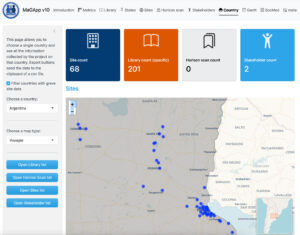 Diego:
Diego:
Over the past 12 months, I have investigated several countries across the Americas and produced a map of mass graves in the South American region. The lack of publicly available information has made it extremely difficult to create a fully comprehensive overview of the existing gravesites. Yet, the open-source data gathered through the MaGPIE project has allowed us to draw a clearer picture of how widespread – and persistent – this method of body disposal is in the region. As no centralised global map of mass graves currently exists, I’m proud to be contributing to the creation of the first of its kind.
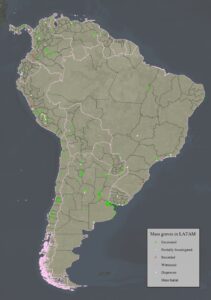
![]() Ellen:
Ellen:
It has been a busy and rewarding year for MaGPIE’s work package 1.1. From mapping Syria’s mass grave sites prior to the fall of the Assad regime to updating them with newly accessible sites, I am especially proud of sharing our findings with international organisations dedicated to searching for Syria’s missing persons. The process directly inspired my PhD research on the topic of ambiguity and the politics of rendering mass graves visible in Syria. My experiences throughout this year have reinforced my belief in both the significance of MaGPIE’s research, and the vital role of academic research in achieving meaningful and effective transitional justice.
Emily:
This year has been one of networking, and yes, I know I am slightly bending my own parameters as it is not just one thing! Highlights include, attending the World Congress on Enforced Disappearance in January, which was both emotive and insightful, and helped cement the direction of my PhD. I also presented my first paper with the wonderful Ellen at the British International Studies Association 2025 conference in association with the incredible team at DISACT, visited Parliament to support with safe engagement with mass graves, and both attended and assisted in organising our own Mass Graves in the Context of Migration and Trafficking conference at Bournemouth University in September, where I had the opportunity to connect with experienced delegates. Forging and developing relationships has been both rewarding and inspiring, and as such, is what I am most proud of this year.
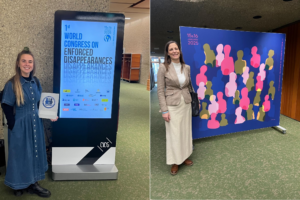
Ian:
MaGPIE has provided me with one of the most useful opportunities in research, to have the time to think. The congregation of discussion, data and enquiries has demonstrated the universality of a number of issues that I have pursued over the years through research (with reference to international investigations), including adequacy, understanding and effectiveness of the law, process, method, implementation, and guidance. Always find time to think!
Jorge, our newest team member, outlines what he is looking forward to over the coming months:
As a newcomer, I am eager to leverage my PhD research to contribute to the project’s aims, particularly by addressing data protection surrounding the mass graves. I also look forward to learning from experts in various fields and to establishing collaborative channels to exchange perspectives, thereby facilitating our collective work. I am committed to promoting our project to reach multiple forums, enabling us to share our team’s collective efforts. Most of all, I am thrilled to work as part of a team that shares the same goals.
Melanie:
One can never quite anticipate how discussions and dynamics at an event develop, but the quality of the round-table event held on 9-10th September – in its entirety – was inspiring, validating and agenda setting. Fittingly, the event started and ended with contributions from families. Their messages were powerful, moving and instructive. Families’ and survivors’ rights are the main reason for engagement with mass graves. They are, in that sense, the beginning and the end point for MaGPIE activities.
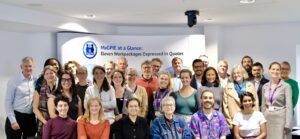
Melanie was also keen (as a supportive supervisor!) to outline the achievements of the MaGPIE PhD students:
Discere mutari est (to learn is to change) is the motto of our university. In this second year of the project, I find this particularly fitting for the MaGPIE team members pursuing doctoral studies and the direction of travel their respective PhDs has taken. It’s easy to celebrate at the end of a journey, but it is important to recognise how much change, flexibility and open mindedness is required at the beginning.
Therefore, in no particular order, here are the highlights of PhD new directions:
Anna for taking herself (and the family) off to conduct fieldwork in Western Australia to be embedded in, and led by, communities;
Diego for continuing to refine his transitional justice indicators with focus on archives;
Emily for drafting the structure of her first publication plan as part of her integrated thesis;
Ellen for receiving fabulous validation by agencies working in Syria for her thesis concept to connect political structures with mass graves in Syria;
Angelica for being courageous to change PhD study-mode to then realise: now is not the right time to pursue doctoral studies; and
Jorge for taking a leap of faith and recently joining us from Mexico to work on data protection applicable to mass graves and the sharing thereof.
Here’s to the next 12 months of research!
